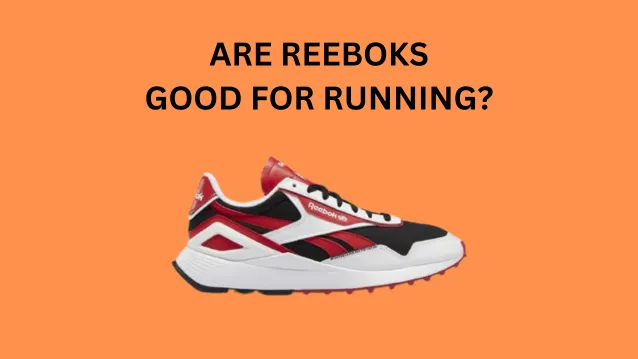Running is one of the most popular forms of exercise and a great way to improve cardiovascular health, build endurance, and burn calories. Having the right pair of running shoes is crucial to prevent injury and enhance performance. Reebok is a major athletic footwear brand, but are their shoes actually good for running?
The Short Answer
Reebok offers several running shoe models that provide the features needed for various types of runners. Key technologies like DMX Foam cushioning and Floatride energy return make many Reeboks well-suited for road running, treadmill running, and jogging.
However, serious runners and marathoners may prefer options from brands like Nike, Brooks, or Saucony that offer more innovative designs catered specifically to competitive runners.
Factors that Determine if a Shoe is Good for Running
- Cushioning – Adequate cushioning in the midsole absorbs impact and reduces strain on the legs and feet during each stride.
- Stability – Running shoes need to have a stable base and midsole to prevent rolling the ankle while changing directions.
- Flexibility – The shoe should bend easily to allow a natural range of motion. Rigid shoes can restrict movement.
- Breathability – Mesh panels and moisture-wicking materials prevent sweaty feet and overheating.
- Weight – Excessively heavy shoes can fatigue the legs quicker and feel uncomfortable over long distances.
- Durability – The outsole needs to withstand repeated abrasion without wearing down too quickly.
Popular Reebok Running Shoes
Reebok has three main types of running shoes for men and women:
Reebok Forever Floatride Energy
Reebok’s top-of-the-line running shoe featuring the Floatride Energy foam midsole provides lightweight, long-lasting cushioning and plenty of responsive bounce. The seamless woven upper is breathable and flexible. Available in both neutral and stability models.
Reebok Floatride Run Fast
Built for speed, the Floatride Run Fast prioritizes energy return and weight reduction. The EVA midsole is responsive while the lightweight mesh upper won’t weigh feet down.
Reebok DMX Series
DMX foam technology has been used in Reebok runners for decades and provides steady underfoot cushioning mile after mile. Models like the DMX Fusion 2, DMX Horizon, and DMX Strata are inexpensive options for trail, road, and gym running.
Key Features that Make Reeboks Good for Running
- Cushioning Technologies: DMX Foam, Floatride energy foam, and PureMove cushioning effectively absorb impact.
- Stable Base: Many Reeboks use a wide bottom platform which helps prevent rolling ankles.
- Breathable Mesh: Woven mesh uppers allow airflow to the foot to reduce heat and moisture buildup.
- Flex Grooves: Grooves along the sole allow the shoe to flex naturally with the foot during the running motion.
- Durable Rubber Outsoles: Carbon rubber outsoles protect against abrasion from concrete and asphalt.
- Lightweight Materials: Usage of modern textiles, foams, and synthetic leather keeps weight down.
Examples of Good Reeboks for Different Types of Runners
Here are some of the best Reebok running shoes based on a runner’s needs and training environment:
- Forever Floatride Energy – Ideal for road running, treadmill running, and race day with responsive Floatride foam. Good for neutral runners.
- Harmony Road 3 – Provides stability features like dual-density midsole and medial support for overpronators. Excellent pavement running shoe.
- Reebok Symmetros – Designed for track running with grippy outsole and lightweight mesh upper to maximize speed.
- Reebok TrailScape – Trail runners appreciate the protective toe bumper and high-traction outsole that grips dirt, rocks, and hills.
- Reebok Hydrorun Trail – Cushioned trail runner made to drain water well and maintain traction through puddles, creeks, and wet terrain.
- Nano X1 – A versatile cross-training shoe suitable for short runs, plyometrics, and gym workouts. Provides medial support.
Potential Drawbacks of Reebok Running Shoes
- Not specialized for long distances – Unlike some brands, Reeboks lack marathon-specific technology suited to running 20+ miles.
- Limited pronation control options – Only a handful of stability Reeboks are made to correct overpronation compared to other brands.
- Lack high-end performance features – Reeboks generally cost less but don’t provide the same racing technology as premium running brands.
- Smaller running shoe selection – Choices are limited compared to larger companies like Nike with dozens of running shoe models.
- Durability concerns – The lifespan of some Reebok foam materials and tread wear down faster than average based on user reviews.
Should You Choose Reeboks or Another Brand for Running?
Reebok running shoes are reasonably priced and offer substantial technology like DMX Foam and Floatride to fuel workouts. For recreational jogging and moderate distance road running, Reeboks can absolutely get the job done.
However, marathon runners and serious racers may be better off choosing shoes from companies that specialize in high-performance running like Brooks, Saucony, Asics, and Nike.
The technology in these brands’ flagship shoes is often more refined and designed for logging major mileage more comfortably. Don’t rule out Reeboks completely, but do try on multiple brands when shopping for new running shoes.
Frequently Asked Questions About Reeboks for Running:
Are Reeboks good for long distance running?
For marathon training, there are better options than Reeboks. Most Reebok shoes lack the ultra-lightweight materials, advanced cushioning systems, and biomechanical alignments vital for comfortable, injury-free miles. Prioritize shoes from Brooks, Saucony, or Asics instead.
How long do Reebok running shoes last?
On average, Reeboks last 300-500 miles before needing replacement. Higher mileage runners may get less than 300 miles. Factors like runner weight, foot strike pattern, and running surfaces impact longevity. Inspect tread wear and midsole compression regularly.
Can you use Reeboks for trail running?
Yes, Reeboks like the Trailscape, Hydrorun Trail, All-Terrain Super 3.0, and others are equipped with grippy aggressive tread, protective features, and shock absorption essential for variable off-road terrain. Focus on trail running Reebok models rather than road shoes.
What technology do Reeboks use for running?
Key Reebok running technologies include DMX Foam, Floatride energy foam, PureMove cushioning, Ultralite foam, and Hexalite cushioning systems. Each provides responsive impact absorption in a lightweight package.
Do Reeboks have arch support?
Many Reeboks utilize an anatomical sockliner that provides basic arch support. Choose shoes labelled as having a medial post or guidance rail for optimal arch stabilization and pronation control while running. Also consider inserting custom orthotics.
In summary, Reeboks can be perfectly acceptable running shoes for casual runners and short to mid-distance road training.
However, competitive runners likely benefit more from advanced shoe technology found in models from Nike, Saucony, Brooks, and other athletic brands with deeper running roots and performance-driven innovations. Carefully assess your running needs before choosing to wear Reeboks for all your miles.


